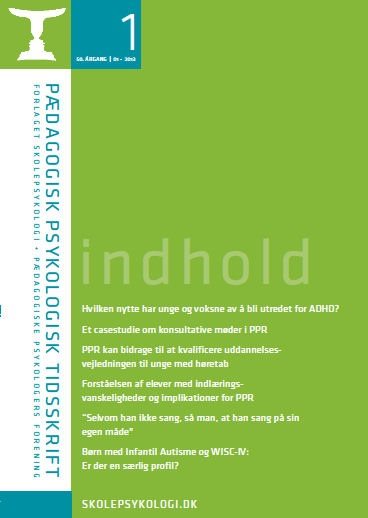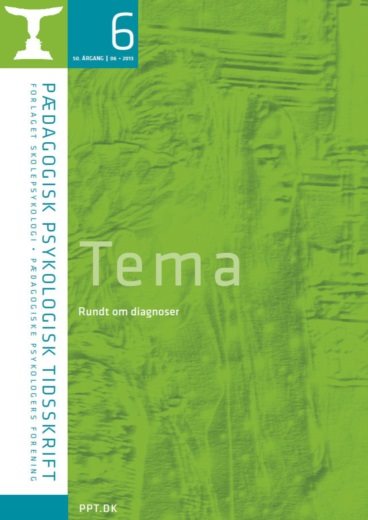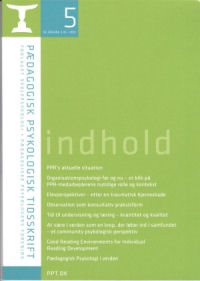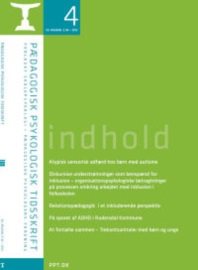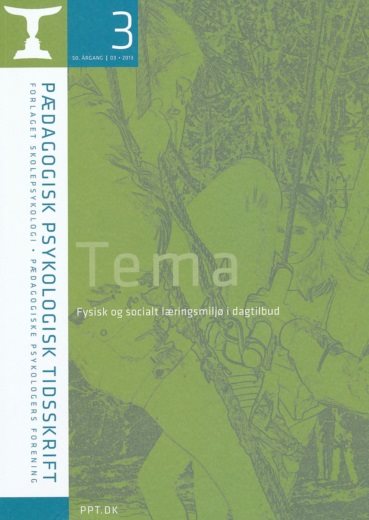Beskrivelse
Abstracts ppt 1/2013:
Hannås; Bjørg, Mari (Lecturer at The University of Nordland). What are the Uses of Diagnosing Youngsters and Adults with ADHD? Pædagogisk Psykologisk
Tidsskrift, 2013, Vol. 46, 1, 3 – 15. – In her doctoral thesis, the author interviewed two groups with ADHD symptoms having been referred to a diagnostic unit. All informants
found it beneficial to now have been diagnosed, because a legitimate explanation of their different social mishaps had been found. Their obtained knowledge
abt. ADHD was found by some as more useful than medication. It was found very common that the respondents developed their own self-governing methods of
medication. – Bjørn Glæsel
Funder, Pernille (Educational psychologist in Vejle). A Case Study of Consultative Meetings at a School Psychological Office. Pædagogisk Psykologisk Tidsskrift, 2013, Vol. 46, 1, 16 – 31.A
change, favouring consultative meetings has happened during the last years. A case study abt. a13 ys. old girl shows that she initially was described as having many problems: stealing, lying, and not frequenting school etc. Two consultative meetings based on a systemic and narrative understanding showed that she also possessed skills, knowledge, and competences. This
study was inspired by Danish and international research by e.g. Schön and Scholten. – Bjørn Glæsel
Jensen; Connie, Cramer (Consultant at the Knowledge Center for Handicaps). Educational Psychology may Qualify the Guidance of Youngsters with Hearing Handicaps. Pædagogisk Psykologisk Tidsskrift, 2013, Vol. 46,1, 32 – 39. – Two Danish investigations recommend better guidance of children with hearing handicaps; more specific knowledge abt. handicaps and more fluent passing on of knowledge between cooperating partners is proposed. What are the implications when some youngsters merely want to be like everybody else? How can their hopes, dreams, and wishes be dealt with? – Connie Cramer Jensen
Szulewicz, Thomas (Lecturer at The University of Aalborg, Ph.D.). Understanding Pupils with General Learning Difficulties and Implications for Educational Psychology. Pædagogisk Psykologisk Tidsskrift, 2013, Vol. 46, 1, 40 – 51 Historically, students with learning disabilities have represented a large proportion of students receiving special education services. This article presents two different perspectives on the understanding of learning disabilities; a cognitive-functionalist perspective and a sociocultural perspective. Pædagogisk 80 Psykologisk Tidsskrift The two different perspectives on learning disabilities are discussed in relation to topics like aetiology, educational practices and research practice. In the final part of the article the implications of the different perspectives on learning disabilities in relation to educational psychology practice are discussed. It is hypothesized that the cognitive-functionalist perspective on learning disabilities seems to play a prominent role in Danish educational psychology service. – Thomas Szulewics
Mumm, Helle (Music therapist and Marte Meo therapist). Even if he didn’t sing you saw that he was singing in his own Way. Pædagogisk Psykologisk Tidsskrift, 2013, Vol. 46, 1, 52 – 64. – The scope of this article is twofold: firstly it presents the application of music therapy in a kindergarten with the aim of preparing children with various cognitive, emotional and social difficulties for school and secondly it offers guidance to the pedagogues with regards to other ways of supporting the children. Methods used in the project include music therapy techniques and marte meo filming and the showing of specific moments as a tool for studying interactions and interventions. The approach is solution oriented and appreciative. First, a small group of 6 children is presented leading on to a second large group format with 16 children and the video clips presented to staff are described. Three bilingual boys with various difficulties serve as examples throughout the article. It is presented how the boys seemed to gradually engage more appropriately in the social activities while the staff developed more rich descriptions of the boys. The author is a music and marte meo therapist and was the leader of the project in collaboration with the local family therapy facility, where she worked while the project took place. The article is based on a presentation given at the 8th Nordic Family Therapy Congress in Bergen 2008. – Helle Mumm
Bavnshøj, Helle & Jungersen, Margrethe (Psychologists at the Speech Institute in Aalborg). Children with Infantile Autism and WISC-IV. Is there a Special Profile? Pædagogisk Psykologisk Tidsskrift, 2013, Vol. 46, 1, 65 – 77. – This article elaborates whether there is a specific cognitive profile in children with Infantile Autism. It examines international studies, data from the standardization of the WISCIV and outlines a pilot study in which WISC-IV is tested on a group of children with Infantile Autism. Overall, there is not one clear picture of a specific cognitive profile
in children with Infantile Autism. – Helle Bavnshøj og Margrethe Jungersen
